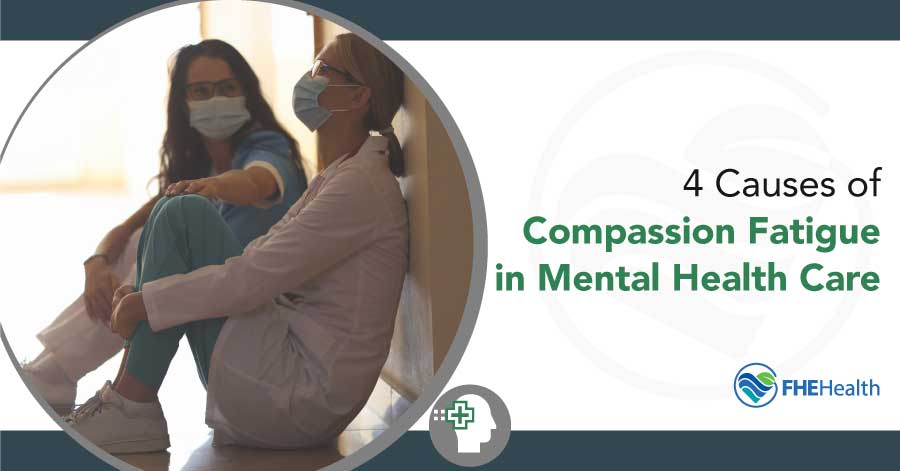
You’ve probably seen news articles about nurse and doctor burnout. And in those discussions, one term that’s often repeated is compassion fatigue in health care. This phrase has made its way into our social discourse of late, with no signs of disappearing. After a raging worldwide pandemic, healthcare workers across the nation have been pushed to their limits. While it’s clear that the long hours are contributing to excessive burnout, another impact is compassion fatigue.
Keep reading for an overview of what compassion fatigue is, the most common causes, and coping strategies.
What Is Compassion Fatigue Syndrome?
Compassion fatigue syndrome, also known as empathy fatigue, is the physical, emotional, and psychological toll helping others takes on an individual. This syndrome is a type of stress fatigue that takes time (weeks, months, or years) to develop and often leads to a significantly decreased ability to empathize with others.
Four Causes of Compassion Fatigue in Health Care
Compassion fatigue in health care is a widespread problem. Some of the four top causes of empathy fatigue are:
1. Repeat Trauma
In health care, individuals working in critical care are often exposed to repeated trauma. Daily, these workers have to deal with people in life-threatening situations. These healthcare workers operate in high-pressure environments where decisions can impact whether someone lives or dies.
Additionally, there’s often no time to recharge or process each trauma. As soon as one person is given help, another critical patient may need assistance. Due to repeat trauma, critical care workers have high rates of compassion fatigue, secondary traumatic stress (STS), and turnover.
2. High Mortality Rates
Another cause of compassion fatigue is the sheer amount of mortality healthcare workers have to witness. While it may be a part of the job, it can affect workers and make them feel like their work has no impact. In addition, when presented with anything repeatedly, you start to become desensitized to it. And that’s true even for something as awful as a patient passing. With enough time, compassion fatigue syndrome can develop, and death starts to feel less tragic.
Studies have found this to be a severe issue for oncology workers, as they often see their patients succumb to cancer. One study found that oncology nurses are at extremely high risk for compassion fatigue, burnout, and a loss of compassion satisfaction.
3. Overwork
Being overworked for long periods leads to a high risk of compassion fatigue. When a healthcare worker has too much on their plate, the typical reaction is to go on autopilot to get through it all.
When you’re robotically going through the day, you don’t have time for compassion or processing emotions. For example, let’s say your favorite patient passes, but you immediately have to deal with three other emergencies. You simply can’t stop and reflect on your loss because you have more work to do.
4. Stress at Home
When you work in a high-stress environment such as health care, you need to go home to relax and recharge. However, if your home is another place of stress, then it becomes impossible to “fill your cup” back up.
As we mentioned earlier, compassion fatigue in health care is a type of stress trauma. When you have stress in multiple areas of your life, you’re highly likely to stop feeling compassion for anyone at work or home. All your emotions and energy are used to stay afloat, and you can’t empathize with others.
Symptoms of Compassion Fatigue
Compassion fatigue syndrome can present itself in many ways. Some of the most common symptoms are:
- Mood swings
- Being overly pessimistic
- Detachment and isolation
- Loss of morale
- Loss of self-worth
- Loss of hope
- Misplaced anger
- Addiction (alcohol, substance abuse, gambling, work)
- Anxiety
- Depression
- Low productivity
- Insomnia
- Exhaustion
- Changes in appetite
- Digestive problems
- Headaches
Ultimately, compassion fatigue can result in serious physical, emotional, and mental side effects in a person. This can have consequences in the individual’s personal life, as well as their professional performance.
Coping With Compassion Fatigue
When looking at how to deal with compassion fatigue, the essential first step is to take care of yourself. Compassion fatigue in health care may be common, but that doesn’t mean it should be accepted or ignored. Individuals should watch for signs of empathy fatigue in themselves or their coworkers and take action when they identify the warning signs. Compassion fatigue can be particularly challenging to spot — in yourself or others — because it develops over time. The person may change over weeks or months, but sometimes it’s a gradual change that occurs over years.
Some of the steps you can take to cope with compassion fatigue are:
- Get enough sleep
- Eat a healthy diet
- Exercise often
- Drink plenty of water
- Take time for self-care (massages, hobbies, pampering, etc.)
- Practice meditation
- Take time off work
- Ensure you have an identity outside of your job
- Have someone you can talk to
If you notice yourself lacking empathy, feeling angry, or blaming others, it might be time to consider speaking to a professional counselor. It’s worth noting that if you’re experiencing empathy fatigue, you’re at a higher risk for addiction. Don’t turn to drugs or alcohol as a way to self-medicate.
Many individuals who let compassion fatigue continue without treatment quit their jobs and may see their personal relationships suffer. Compassion fatigue won’t just go away without you acknowledging it and trying to make a change. There’s no shame in getting help from a counselor to address compassion fatigue before it gets worse.
FHE Health Is Here to Help
You don’t have to deal with compassion fatigue on your own. The counselors at FHE Health are available 24/7 to help you get through it. With some commitment, you can get back to feeling like your usual, empathetic self. Contact us today at (833) 596-3502 to get started.






